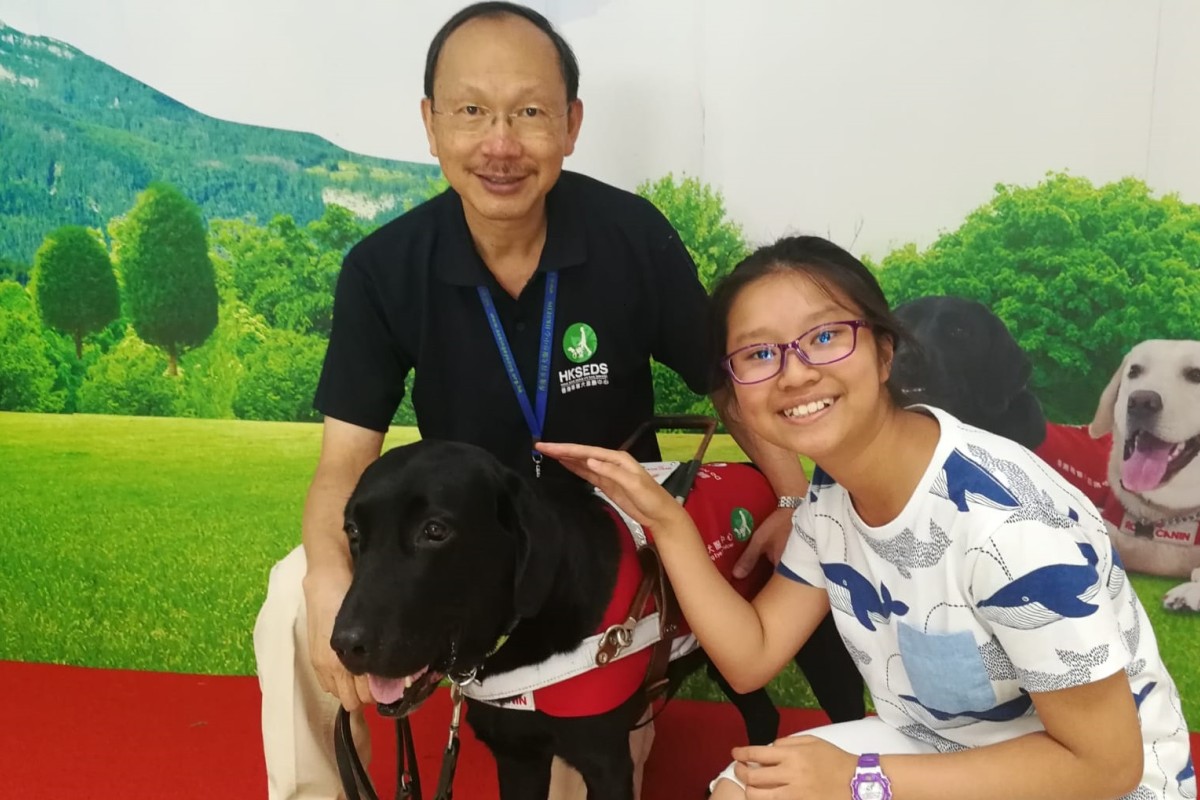
 Guide dog trainer Raymond Cheung says that labradors are the best type of dog to use as guide dogs in HK.
Guide dog trainer Raymond Cheung says that labradors are the best type of dog to use as guide dogs in HK.When it comes to service dogs for the visually impaired, Hong Kong has a serious supply and demand problem, and it’s affecting many people’s daily lives.
According to the International Guide Dog Federation, around 1,700 visually impaired people in the city need guide dogs, but there are only around 100 dogs, including puppies and breeding dogs, ready for the job. Many of these dogs are trained by the Hong Kong Seeing Eye Dog Services (HKSEDS), the first organisation in Hong Kong to be internationally recognised as a training school for both service dogs and handlers.
Its chairman and founder, Raymond Cheung Wai-man, wants to fix Hong Kong’s guide dog shortage. He’s been training guide dogs since 1990, and the service now has 56 dogs, 12 of which are currently in service. By breeding new dogs, as well as training existing dogs and their human handlers, Cheung says he wants to close the gap between the number of visually impaired people, and the number of service dogs, in the city.
So why can’t all dogs in need of a home simply become guide dogs? As Cheung explains, not all dogs are suitable for the task.
“Chihuahuas won’t do because they’re too small and can’t see very far,” he says. “Bigger sized dogs won’t work, either, because there is a chance they could be too strong for the user, and the user might fall over.”
The size of the dog matters, because it needs to be able to lead a person along without pulling them over. The HKSEDS trains labradors, which Cheung says are the best type of dog to use as guide dogs in Hong Kong.
“They are obedient and listen to instructions, they are the perfect height for the average human, they are a good size for travel, and they have a good reputation among Hongkongers.”
The reputation of the breed of dog, in fact, is a more important factor than you might think when it comes to training them to lead the visually impaired.
“In other countries, German Shepherds are trained as guide dogs, but in Hong Kong, many people think German Shepherds are scary, and they don’t allow [the dogs] into shops.”
According to Cheung, the three factors which should be taken into account when selecting a guide dog are health, temperament (nature or behaviour), and safety.
“If both the mother and father of a dog are good at listening to instructions then, in theory, their puppy should have the same qualities. But we can’t account for family genes that skip generations – for example, a puppy may be hyperactive and bad at listening to instructions because his ancestor acted that way as well.”
What’s more, different guide dog users will have different needs from their dogs. “Owners who work require an active dog that will be able to keep up with their owner’s [working life],” explains Cheung.
But it isn’t just about finding a dog who can meet its owners needs. The owner also needs to be able to provide a good home for their dog. A visually impaired person who is very young may not be able to take on the responsibility of having a guide dog, while someone who is very old may have family who can take better care of them than a guide dog could.
Guide dog owners also need to have fairly active lifestyles – if they spend all day at home, they might not have much need for a guide dog.
“Visually impaired people who own guide dogs are very independent,” says Cheung. “They have to be able to know their way to at least three different places without getting lost or hurt. If you go to yum cha everyday, a guide dog will know the way [there]. But it is not a GPS – if, one day, you decide to go to McDonald's instead, the dog will be confused because it has never been there before.”
There is a set of requirements for guide dog trainers, too. “If you want to be a guide dog trainer, you have to be prepared to commit,” says Cheung. That’s because it takes six to eight months to train a guide dog, he explains. During that period, trainers must spend a lot of time practising with their dogs, even when it’s raining or extremely hot.
Behind the adorable doggy or kitty you see in the pet shop window is unseen pet cruelty
Cheung adds that when people see guide dogs on the street they should stick to the “three don’ts and one do” rule: “Don’t disturb it, don’t feed it, and don’t pet it without permission from the handler – but do offer help when you see a visually impaired user and his or her guide dog who seem to be lost.”
If you really want to get close to a guide dog, Cheung suggests becoming a guide dog foster parent – or “puppy walker”, as they are known. For those who love dogs but who are unable to commit to adopting one of their own, being a puppy walker is the next best thing. Foster families take care of their puppy for one year and teach it basic commands so that it is eventually ready for its guide dog training. From puppy walkers to trainers, it takes a whole team to prepare a dog for life as a service dog. But the difference a guide dog can make to the life of a visually impaired person makes it all worth it.
Edited by Charlotte Ames-Ettridge

